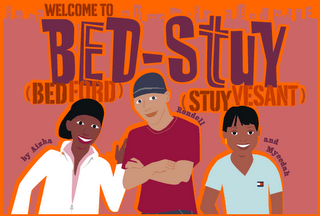Acclaimed freelance writer Kalil Honsou begins his year long search for Jimmy Waters, a basketball player whom Michael Jordan, himself, believes is the “Greatest of All Time”.
I searched records from high school players in Bed Stuy, and found no “Jimmy Waters”.
I widened my search to high school players in the other boroughs. No luck.
And even though Mike told me “Jimmy Waters” never made it to college, I searched the records anyway. To no avail.
I spent about for or so months, on and off, pouring through old, dusty archives, and poorly copied mimeographs, risking black lung and myopia searching for a ghost. I then realized that Michael was pulling my leg after all, and my interest in Jimmy Waters started to wane.
A few weeks later, I was chatting with another freelance writer friend of mine named Tek-9, at a vegetarian restaurant in the Harlem. Tek-9 wrote a lot of copy for The Source magazine and he’s somewhat of a legend.
(Rumor has it that one day Suge Knight cornered Tek out in the back alley of some record release party in Manhattan, for one of those shitty acts Death Row was promoting after Dr. Dre left the label. This was just after Suge was released from jail [again], and even though it was a long while after Pac and Biggie got hit, he was still riding high on the image of fear he was generating on the streets of both coasts. Suge was famous for his intimidation tactics [like dangling Vanilla Ice out a penthouse window in Miami to get him to sign over his royalties], and all of us writers were, well… frankly, we were running scared. I know a lot of writers who talked shit whenever and wherever, except when Suge was around. When Suge showed up, everybody’s mouths clamped shut. Except for Tek-9. A week before the confrontation Tek had given Death Row’s latest release zero mics, and wrote a scathing review that equated the future of Death Row under Knight’s command to the last days of Howard Dean’s bid for the 2004 Democratic Nomination. Apparently Suge took umbrage with the review. Suge confronted Tek, and the rumor is Suge came “heavy”. No body really knows what happened that night other than Tek and Suge, and neither one spoke a work about it. But Tek had walked away without a mark, and Suge spent the rest of his New York trip sporting thick sunglasses, apparently to hide an “eye jammy” that looked suspiciously like the butt end of his own Mark VII .357 “Desert Eagle”. Mitch “Blood” Green, like a motherfucker!)

Suge, three days after his meeting with Tek-9.
I was just chatting with Tek about nothing and everything. We discussed Bloomberg versus Giuliani and came to the conclusion that they were both full of shit. We talked about how we missed groups like Public Enemy, especially in the days of Bush’s second disastrous term in office. We discussed Jay-Z’s retirement, and made bets when he was going to return to the mic (September 2006. For the record, I won so pay me my “fiddy” dollars, bi-atch!). That led to a talk about Jordan and his three retirements. It was then I remembered that Tek had an encyclopedic memory of street basketball players. I asked Tek if he knew of a player named Jimmy Waters.
“Who?” he replied.
“You never heard of a street player named ‘Jimmy Waters”? Michael Jordan calls him the greatest player of all time.”
“…the fuck you talking ‘bout, son? Ain’t nobody greater than Mike!”
“I know, I know!” I said. “I’ve been searching player stats and there’s nobody with a better record.”
“You serious about this, Kay?” Tek asked.
I shrugged.
Tek started to think. He truly pondered my quandary.
He said: “A guy like Mike, you ain’t never gonna find anybody on paper better than him. So you’re looking up the wrong tree, son. You searching for the unknown, the unsung hero. The man in black.”
“Yeah, but does he exist?”
“If he does, Bed-Stuy is the perfect place to look for him. Bed-Stuy is full of unsung hero’s. The streets are littered with stories, tales, and legends you ain’t never going to hear. You won’t find 'em in no ‘lie-bury’, no internet and in no rap song. These stories, they too bloody, too hardcore for public consumption. You can’t find that shit in Harlem, son. You gotta go straight to the streets. You gotta walk the streets and wait for them to tell you the tales.”
“That’s just your way of telling me you don’t know who the fucker is.”
“No I don’t. But I tell you what I do know, son. What ever makes him the “greatest” ain’t got nothing’ to do with points and shit. It’s gotta be the story. If he does exist, I know who would know who he is.”
Tek wrote an address down for me.
“Go see this man. Go walk the streets.”
* * *
Three days later I knocked on the office door of Coach Elijah Roberts. He coached the boy’s basketball team at Peter Stuyvesant High, at the corner of Fulton and Schenectady.
“My name is Kalil Honsou, and I am a freelance writer.” I said by way of introduction. “I’m writing a story on Jimmy Waters.”
Coach Roberts looked at me for a long time.
“It’s about time,” he said. “Come on in.”
To be continued…


Bedford-Stuyvesant is one of the few neighborhoods in New York City to possess an identity and culture that is known to audiences outside of New York City. Director Spike Lee has prominently featured the streets and brownstone blocks of Bedford Stuyvesant in his films, including Do The Right Thing (1989) and Crooklyn (1994). Chris Rock's television sitcom, Everybody Hates Chris, portrays Rock's life growing up as a teenager in Bedford-Stuyvesant in 1983. The neighborhood was also the setting of Dave Chappelle's 2004 documentary Block Party, in which Chappelle and many prominent Rap and Soul artists performed an impromptu concert on a street corner.


No comments:
Post a Comment